The Many Blues Careers of Johnny Shines
Searching for the guy who went searching with Robert Johnson
In a just world, Johnny Shines would have been recognized as blues royalty. At least after his 1992 death. Or really at any time during his multiple, distinct, separated-by- decades careers in the blues.
The guitarist and singer was born in Frazer Tennessee, which is now an exurb of Memphis, in 1915; his family moved to the city itself when he was 6. His mother taught him to play, and as a teenager he and his friends busked on streetcorners in Memphis. By age 20, he’d met the legendary Robert Johnson, and spent much of the next two years traveling with the legend, absorbing the unwritten codes and crowdpleasing tactics of the Delta blues while scrambling for gigs throughout the South.
The two parted ways in 1937. Johnson died in 1938, and after a few more years of inconsequential touring, Shines headed North, stopping in Chicago in 1941, where a cousin lined up construction work. Shines kept that job throughout a long stretch of the late ‘40s and early ‘50s when he began recording with Chicago blues artists. His first four tracks, including “Delta Pine Blues” on the playlist, went unreleased by Columbia, only seeing daylight in 1973. Then came a stint with Chess Records, and incredibly that wasn’t issued at the time, either; his “So Glad I Found You,” recorded under the name Shoe Shine Johnny, combines elements of the reedy, distinctive Robert Johnson singing style with an assertive Chicago pulse. It’s possible to feel Shines’ lineage – even those bluesmen who didn’t know Johnson couldn’t entirely escape his musical identity – but he’s clearly got his own ideas about pacing, delivery, drama.
In 1953, Shines and harmonica master Walter Horton began what became a long collaboration. There were intimate, acoustic studio sides on the small J.O.B. label, including a lacerating single, “Evening Shuffle,” but not all of those were released, and that’s unfortunate given that blues scholars regard them as Shines’ peak work. Even more lamentable: Several labels have issued compilations of that material over the years, yet somehow it doesn’t reside on streaming platforms. Link below is from YouTube.
That period in Shines’ career ended in 1958, over a dispute with the Musician’s Union. He didn’t disappear from Chicago’s thriving blues scene, however: He worked as a photographer at live events in clubs, snapping photos for patrons while also capturing the artists at work.
Shines returned to active music-making in the mid ‘60s, as interest in the folk-blues revival intensified and his association with Robert Johnson became more widely known. He and Horton appear on Volume 3 of the Vanguard label’s popular Chicago/Blues/Today! series, and recorded an instrumental track with pianist Otis Spann that was destined for the incredibly vital and damn near essential Nobody Knows My Troubles: Otis Spann’s Chicago Blues but didn’t make the cut; it appeared as a bonus track on the 1994 CD version.
Eventually Shines got more chances to record. In 1968, he dropped Last Night’s Dream; the following year, Testament Records put out a collection of live dates with Horton and Luther Allison from 1966 and 1969; for a glimpse of how harrowing Shines could be as a singer, check out his reedy, urgent vocal performance on the opener “Hello Central.” Shines returned to a more downcast acoustic atmosphere for Too Wet To Plow (1975), a spellbinding index of troubles real and imagined and the ways men respond to them. In his Rolling Stone review, Greil Marcus wrote “This blues creates a silence asking to be broken.”
Shines didn’t get much crossover bump from that review, and his recording work in the late ‘70s was erratic – though some decades-old tracks did finally surface on compilation albums. One of his last collaborations was with Robert Jr. Lockwood, another Delta fixture who learned guitar from Robert Johnson. Shines and Lockwood toured beginning in the late ‘70s, and were recorded several times. This album contains versions of enduring, near-standard blues tunes written by each artist, and the small group of accompanists includes the great Sunnyland Slim on piano.
Here’s the thing: Despite the patchy discography, there’s no shortage of documentation about Johnny Shines. His most thrilling studio performances are available somewhere in the big database in the sky. He had the full blues ride, with some high points and lots of character-building indifference. His Johnson association alone makes him part of blues history, but he should be appreciated for more than that – specifically for the Delta energy he brought to the electric blues roaring out of Chicago in the ‘50s, and for the harrowingly intimate small-group recordings he made in the ‘70s, which opened up new nuanced dimensions of the blues for those who’d discovered it through rock.
I started thinking about Shines during the recent (agonizingly ongoing) coverage of the death of Tyre Nichols at the hands of Memphis police. There’s some complicated evil at work right there – layers of it, institutional in nature, interlaced with the still-unresolved legacies of racism. Shines and everyone associated with the blues dealt with various versions of this as a fact of life, a hazard of the trade. They testified about it, told of the evils humans foist upon each other, offered cautionary tales about living in a constant state of fear and hate. They did this in plain language, with no cleverly lawyered fine print. And even when not too many people were listening, they kept on doing it – distilling complicated evil down to a simple sonic essence, a form of truth telling that transcends words.



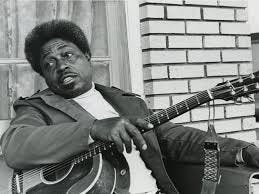
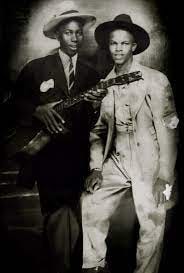
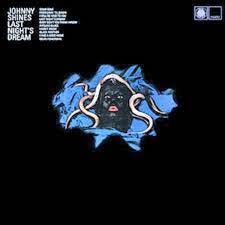
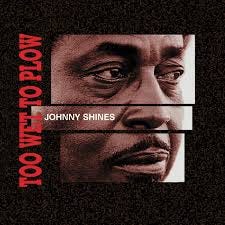
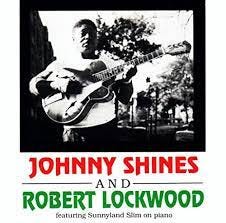

I was fortunate to see Johnny live in Cambridge, MA, in 1988. He was blind and needed to be led onstage, and looked extremely weak. He seemed unaware of his surroundings, vaguely disoriented. He was seated on a stool, and a guitar was placed in his hands. And then he opened his mouth and turned time back 50 years. He sounded just like the Johnny Shines on his earlier recordings. It was truly beautiful and breathtaking. I feel truly fortunate to have been there and to feel the shivers he gave all of us.
Everything I know about Johnny Shines is from the music and liner notes of this wonderful LP he made in 1974 with David Bromberg. I can't remember why my mom bought it, but I'm glad she did! https://www.discogs.com/release/3314788-Johnny-Shines-Johnny-Shines-Co